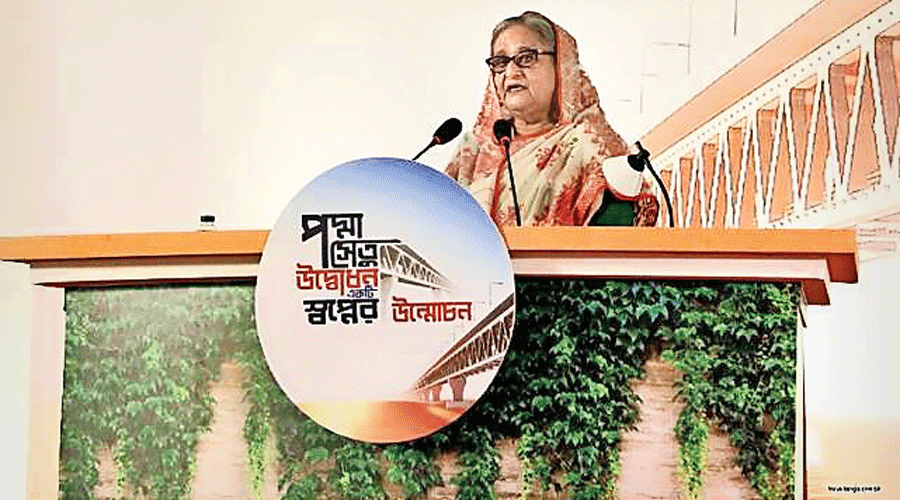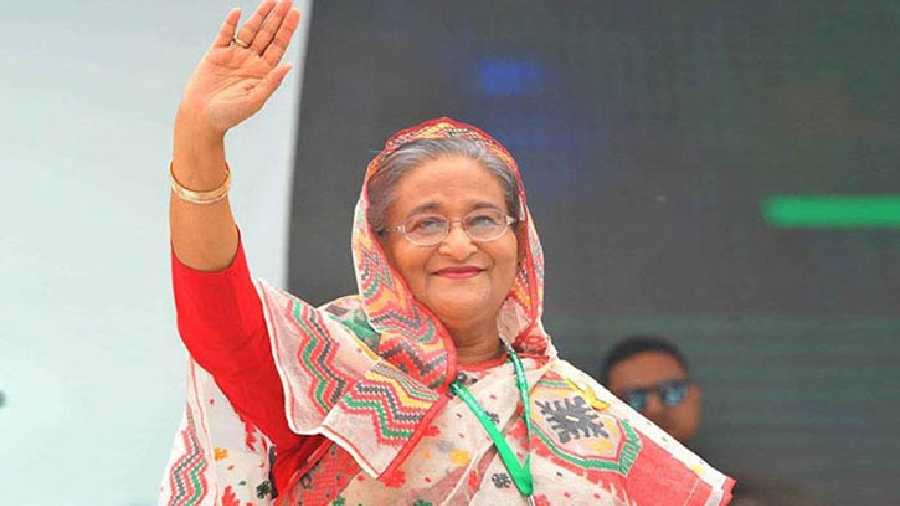The Sheikh Hasina government in Bangladesh has begun discussions with the World Bank and the IMF for budgetary support with the twin objectives of dealing with an external payment deficit and shortages in foreign currency and initiating structural reforms in the country.
Bangladesh has been a bright spot among the economies in South Asia, growing at a rate of over 6 per cent for over a decade.
Multiple sources in Dhaka confirmed that the finance ministry was expecting a $4.5-billion low-interest loan from the IMF and a zero-interest loan in excess of $1 billion from the World Bank over the next three years.
"Preliminary talks between the government and IMF officials took place earlier this week.… The discussions are expected to go to the next level in the middle of this month when an IMF mission will be in Dhaka on a scheduled visit to assess the economic situation in the country,” said a source who is aware of the deliberations between the Washington-based lenders and finance ministry officials in Dhaka.
The formal request for the loans, the source said, is likely to be sent from the finance ministry after a clearance from Prime Minister Hasina, who is expected to brief the cabinet on the subject sometime next week.
Unlike its South Asian peers Sri Lanka and Pakistan, which sought help from the multilateral funding agencies after facing acute financial crises, Bangladesh does not face any immediate danger.
A source in Dhaka said the discussions began as part of preparations to protect the country at a time the world economy is believed to be entering a protracted period of feeble growth and elevated inflation.
Bangladesh received budget support from the IMF for the first time in 1991-92 and again in 2011-12. The disbursals on both occasions, meant to tackle balance-of-payment problems, were linked to conditions like overhauling the taxation system.
The country received a $750-million assistance during the Covid-19 pandemic, but it wasn’t tied to any conditions.
“If the talks materialise this time, it will be the biggest disbursal by the lenders in the history of Bangladesh,” a source said.
In view of the present celebratory mood in Bangladesh after the Padma Bridge inauguration last week -- the large infrastructure project with its own funds has uncorked a new brand of nationalism in the country -- many believe the timing is right to go in for some structural reforms of the economy by accepting the loans and fulfilling the associated conditions.
They cite two reasons. First, while the economy is in stress -- inflation reached an eight-year high of 7.42 per cent in May while forex reserves fell below $42 billion (the lowest in 18 months) and the tax-to-GDP ratio remained low at 8.5 per cent -- the World Bank has assessed that Bangladesh remains at low risk of external and public debt distress as the medium-term growth outlook remains strong.
“However it is also true that high oil and food prices, caused by the war in Ukraine, have begun having a strong negative impact on peoples’ real incomes.… Besides, growth in advanced economies is projected to decelerate sharply, which would have an adverse impact on our export earnings and flow of remittances,” a Bangladeshi economist said.
“The government needs to plan in advance as there is no point going to the doctor once the patient is dead,” the economist added.
The second reason -- which justifies attempts at course correction -- can be linked to political factors as the country heads to its next general election in December 2023.
“The incumbent government will face an election next year.… As IMF conditions often involve difficult decisions like reductions in subsidy bills, it is difficult to implement them ahead of an election. As the elections are still around 18 months away, the timing is right,” a source said.
An aide to Hasina said the Bangladesh government -- especially Hasina, known for her conservative stance on fiscal matters -- has developed an appetite for reforms and this year’s budget, tabled on June 9, mentioned its commitment to stabilising the exchange rate, increasing revenues, rationalising subsidies and taming inflation.
On Thursday, the Bangladesh Bank, the country’s central bank, raised the policy rate by 50 basis points -- a record hike in recent history -- signalling that containing inflation and keeping foreign exchange reserves stable were its priorities.
Over the last few months, the volatility on the foreign exchange market has put pressure on reserves, which has prompted the central bank to intervene repeatedly, by pumping in over $7billion, to tackle the dollar crisis.
The interbank exchange rate on Friday stood at Tk (takas) 93.45 per dollar, which was Tk 84.81 in June 2021, an official said, adding that the government is taking measures to prevent a freefall of the currency.
Besides deferring non-urgent projects by six months and prohibiting foreign tours by officials unless they are urgent, the Bangladesh government has recently ordered early closure of shopping malls, stores and markets to save on energy and, in turn, foreign exchange. Bangladesh has to cough up a huge coal and oil import bill.
The central bank is introducing a new refinancing line of credit for import-substituting products and taking measures to discourage the import of luxury products.
“Our government and the institutions are doing what they can…. The assistance from the IMF and the World Bank will complement the process. As we are in a much better situation than Sri Lanka and Pakistan, we do not expect stringent conditionalities attached to the loans from the lenders,” a source said.
Contacted, Anand Rahul, IMF mission chief for Bangladesh, said: “The IMF has not received a formal request for financial support from the authorities. The IMF stands ready to support the authorities, and if requested, the staff will engage with the authorities as per the established policies and procedures.”











